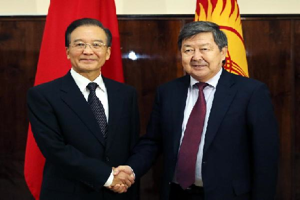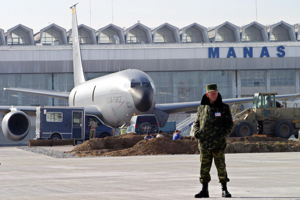Nazarbayev Visits China To Meet Its new Leadership
by Georgiy Voloshin (04/17/2013 issue of the CACI Analyst)
On April 6, Kazakhstan’s President Nursultan Nazarbaev paid an official visit to the People’s Republic of China where he met with the new Chinese leader Xi Jinping to discuss the state of bilateral relations between Astana and Beijing. As Nazarbaev recalled during his interview for China Daily, the strengthening of the Kazakhstani-Chinese partnership remains one of the priorities of the “Kazakhstan-2050” strategy unveiled in late December 2012.
Kyrgyzstan Between China And Russia
by Dmitry Shlapentokh (04/17/2013 issue of the CACI Analyst)
China’s new President Xi Jinping has underlined the crucial importance of China’s relationship with Russia and proclaimed that Russia would be his first foreign destination. Yet, despite mutual assurances and common interests in some areas, China and Russia also increasingly compete in Central Asia, not least in their approaches to Kyrgyzstan. In 2012, Kyrgyz authorities signed several agreements with both Russia and China. Agreements with Russia primarily stress military strategic matters, while those with China emphasize economic ties that, barring major conflict in the area, will be more important than military help for Kyrgyzstan. Hence China, not the U.S. or Turkey, is emerging as Russia’s major competitor for influence in Kyrgyzstan.

Kyrgyz Opposition Leaders Sentenced For Attempt To Overthrow Government
by Joldosh Osmonov (03/20/2013 issue of the CACI Analyst)
The trial against three Kyrgyz opposition leaders is at its final stage and is the topic of widespread public discussions over the current opposition’s ability to mobilize public support against the country’s leadership. While most experts think the Kyrgyz public is currently in no mood to support protests and rallies, others claim that the opposition’s prospects for attracting support for such actions are underestimated.
Russia To Replace U.S. Airbase In Kyrgyzstan With Civic Logistics Center
by Joldosh Osmonov (03/06/2013 issue of the CACI Analyst)
After the U.S. evacuates the Transit Center at the Manas airport in 2014, Russia intends to replace it with a civic cargo logistics center. However, it is still unknown whether the U.S. airbase will actually be removed and the heated discussions around the issue are at their height.
What Options For U.S. Influence In Central Asia After Manas?
by Jacob Zenn (03/06/2013 issue of the CACI Analyst)
Kyrgyzstan has made clear that the U.S. must withdraw all of its troops from the Transit Center in Manas when the current lease agreement expires in the summer of 2014. During the ten-plus years of U.S. presence in Afghanistan, the U.S. depended on Central Asian countries, particularly Kazakhstan, Kyrgyzstan, Uzbekistan and Tajikistan, to funnel military supplies through the Northern Distribution Network into Afghanistan. This led to an increase in U.S. military and political influence in Central Asia. However, with the U.S. withdrawal from Afghanistan and Kyrgyzstan opposing continuing the lease, there are doubts whether the U.S. will retain any influence in Central Asia after 2014.








